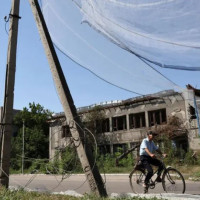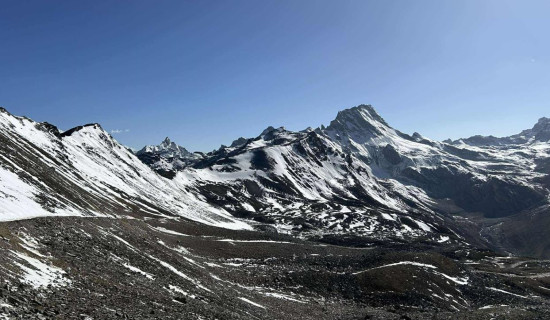- Thursday, 17 July 2025
World Faces Leadership Vacuum
We live in a world that is witnessing accelerated challenges in technology, demographics, geopolitics, institutions, transnational crimes and climate change. The most powerful country on earth – the United States of America and the leader of the liberal world order is showing signs of retreat from its role. Immediately after his inauguration, US President Donald Trump signed a series of executive orders including the withdrawal from the Paris Climate Accord and the World Health Organisation. These executive orders provide insights into his priorities and how his second term may unfold in the coming months and years. The retreat, argues Francis Fukuyama, “creates a dangerous vacuum, inviting instability and the resurgence of the law of the jungle in international relations.”
With the US prioritising Make America Great Again (MAGA), over global stability and leadership, China pursuing its aspirations for global leadership, Europe divided over Ukraine war and grappling with internal challenges, and Asia - the brightest spot of the twenty first century with largest number of flashpoints - put the world’s security crisis at worst since 1945. With strong rhetoric and peaked populist politics, new reality remains defined by fragmented power centres. With global order in transition and no one in charge to drive a global agenda is fostering a survival-of-the-fittest approach, pushing smaller nations vulnerable and medium-sized powers at the mercy of uncharted waters. The era of unified global leadership, once anchored by a dominant nation, has given way to fragmented strategies and outbreak of regional conflicts.
Limitations of military power
The withdrawal from Afghanistan in 2021 under the Biden administration highlighted the limitations of military power to solve underlying political problems and U.S. commitment to long-term global responsibilities. Similarly, China’s Belt and Road Initiative (BRI), hailed as “the project of the century,” and centerpiece of China’s economic engagement with more than 140 developing countries as a massive infrastructure development campaign seems slowing due to significant economic burdens on poor nations, and slowing of Chinese economy. Russia’s invasion of Ukraine since February 24, 2022, further underscores the vacuum in global leadership and the lack of a decisive international response has destabilised Europe.
Despite efforts by Germany and France to lead, the European Union remains divided over the Ukraine war and internal conflicts regarding energy policy disagreements. The Economist (January 16, 2025) writes President Trump’s “second term will not only be more disruptive than his first; it will also supplant a vision of foreign policy that has dominated America since the second world war.” How President’s promise of “peace through strength,” will unfold in coming days needs to be carefully watched. David Sanger writes in the New York Times that President’s words “nothing will stand in our way,” will make “America far more conservative at home and more imperial abroad.”
Geographically significant Middle East remains highly volatile since October 7, 2023. The Global South - formerly the Third World - with some 120 countries sharing common challenges and historical legacy, faces a fierce contest for greater influence among the United States, China and India. South Asia, as a region, is a real source of much of global terrorism. Cross-border terrorism and danger of nuclear weapons falling into the hands of terrorists vitiates friendly atmosphere - compounded by fragile governance, economic turmoil, populist politics and external pressures in the region.
Afghanistan’s return to the Taliban rule following the U.S. withdrawal has led to economic and humanitarian crises. Pakistan and Iran competing for influence in Afghanistan. There is a dilemma over whether to engage or not with the Taliban regime. All add to instability, confusion, economic mismanagement, and a strained relationship. Sri Lanka’s 2022 economic crisis, driven by unsustainable debt and political mismanagement, highlights the vulnerability of smaller nations. Bangladesh, faces challenges of managing “second liberation,” after August 5 revolution, climate vulnerability and the ongoing Rohingya refugee crisis. The Maldives, highly reliant on tourism, remains existentially threatened by climate change, with little support from the global community.
Bhutan talks of gross national happiness and democracy, yet has evicted one sixth of its population who worked hard to strengthen the institution of monarchy in the country. Nepal struggles with its own challenges, including excessive economic dependency and limited institutional capacities for leadership. India, the world’s largest democracy with biggest population, and fastest growing economy, appears confident focusing on 2047 Viksit Bharat agenda to celebrate the centenary of independence.
The future of South Asia hinges on its ability to address internal polarization, growing inequality and populist politics. If current trends persist, the region will likely experience continued political instability and economic stagnation. Persistent India-Pakistan tensions, cross-border terrorism and unresolved issues in Afghanistan, are holding back opportunities for the region. Climate change will exacerbate resource conflicts and displacements, posing existential threats to countries in the region. Economic dependency on external powers for infrastructure and investment risks deepening inequalities and fueling geopolitical rivalries.
Leaders are meant to lead and inspire, and not to discourage people. We often think of leadership of revolutionary generation as they were able to provide political thought of enduring significance. That leadership of 20th century displayed creative talents than any subsequent generation of leaders. Their words enjoy a special relevance in our own times despite the onset of a new information age. The world is missing a leader to offer solutions and directions defined by wisdom and balance. There is a growing disconnect between leaders and people and good communication is being lost between political and scientific worlds.
Nepal’s position under these circumstances highlights both challenges and opportunities. Situated between India and China, Nepal remains excessively dependent on external aid, and remittances, making it vulnerable to external shocks and geopolitical pressures. The lack of a unified political vision has further limited its ability to play any useful role. There are immense opportunities, if Nepal chooses to leverage its natural resources, particularly hydropower, tourism and honest and hardworking human resources to assert economic significance.
Economic security and national security are closely interlinked. Foreign policy has a bearing on country’s development and cannot be viewed in isolation. A domestically strong nation generates credibility and strength abroad. Achieving this potential will require a strong, effective and efficient state with stable governance, visionary leadership, and effective regional collaboration with clear and measurable goals.
(Author is a former ambassador to the UN.)

















